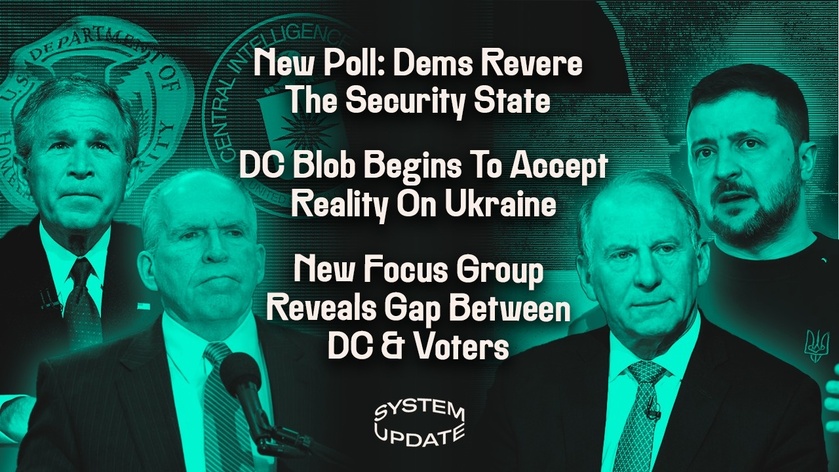Watch the full episode HERE
It's Wednesday, September 25.
Tonight: One of the most ignored stories of the Trump era has been the complete switch on so many issues between the parties. None is more pronounced than how the Democratic Party has become the party that reveres the U.S. Security State – the CIA, FBI, Pentagon, and even Homeland Security – while skepticism about those agencies is now found overwhelmingly among conservatives. The same is true for many issues, including the justifiability of state censorship online and the nobility of NATO wars. But nowhere is more pronounced than one's views on these security agencies, and a new comprehensive Gallup poll today demonstrates just how vivid this shift has become. We're going to analyze that poll and explain the implications.
Then: One of the most mainstream figureheads of the US Foreign Policy Community is Richard Haass, who spent the last 20 years as the President of the Council on Foreign Relations and in and out of various foreign policy positions with both parties. Earlier this morning, Haass went on Morning Joe – now Ground Zero for mainstream DC ruling class thought – and said things about the war in Ukraine that, up until about a month ago, was a taboo idea, one that if you expressed would immediately subject you to accusations of being a Russian agent or propagandist. Haass announced that it is time for the US and NATO to embrace what he called a more realistic goal for this war, given that it is simply impossible to achieve what had been defined as a victory by the West since the start: namely, that Ukraine will have to cede part of the territory Russia has taken to achieve peace.
Beyond the specific concession – one that has been slowly brewing in mainstream foreign policy circles, preparing the public to have to accept this without realizing that they're now accepting something that they were told they would never have to – we're seeing here the standard pattern for how U.S. elites sell wars to its population. In the beginning, they drown them with tsunamis of maximalist proclamations of inevitable victory – we'll defeat the Vietcong in a year; we'll depose Saddam and restore democracy to Iraq in months; we'll expel every Russian troop from Ukrainian soil, even Crimea. Anyone who points out that these claims are dubious or even deceitful is accused of being a traitor, accused of only saying those things because they're on the other side or they hate their own country. And that happens all the way up until the point where those same elites who wanted that war sold start to get tired of their war, decide that they're bored with it, that they've already done enough with it, and they want to move on to other toys, to new wars. And then when they do, they begin admitting that those initial propagandistic claims are now false, at the moment that they decide it's permissible to say that. We'll take a look at that amazing Richard Haass interview today and how this trend has been going on for quite some time.
And then finally: few things are more glaring and overlooked than the ongoing massive gap between how elite opinion, on the one hand, understands the United States in the world and how ordinary Americans, on the other, understand that. It is impossible to understand politics over the last eight years, without a fundamental, overarching recognition of this massive gap that continues to grow, and there are few things more entertaining or illustrative than media elites going on some sort of field trip to visit the exotic species they call ordinary Americans whose habitat is in the middle of the country at these little neighborhoods and communities that when they're very brave, they like to go and visit. One of us, an NBC personality named Alex Wagner, made such an excursion to Michigan, and the results were predictably comical as it turns out. Yet again, people who work for a living and have to worry about paying bills and supporting a family with rising prices for things like groceries and everyday needs have much different priorities than media figures who work for major media outlets in New York and Washington, or for celebrities who dominate our political discourse and set the agenda for what matters to them. This recent visit by Alex Wagner, this courageous visit to the middle of the country to talk to the ordinary folk, really illustrates just how wide this gap has become.
For now, welcome to a new episode of System Update, starting right now.






















